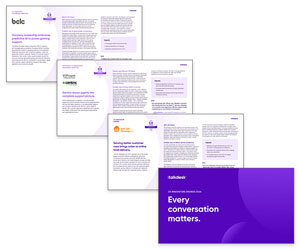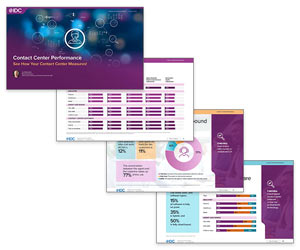We often think of a contact centre manager as someone who schedules the agents’ time and walks around the office making sure everything is going smoothly—which is true, but contact centre management is so much more than that.
Managing a contact centre is not an easy task. Contact centre managers are focused on delivering amazing customer experiences while ensuring that their agents are truly engaged and offering them the orientation and right tools for performing their best at work.
It requires a deep understanding of the industry they operate in, empathy, organized planning, strategic thinking, and the ability to motivate people to reach high expectations.
If you’re new in the contact centre industry or are just looking to improve your management skills, hold on to your seat. In this article, we will guide you through everything you need to know:
- What is contact centre management.
- What are the responsibilities of a contact centre manager.
- Important skills for every contact centre manager.
- Best practices for your contact centre management strategy.
What Is Contact Centre Management?
In simple words, contact centre management is the way a business manages the daily operations of its contact centre workforce and contact centre software to deliver consistent and delightful customer experiences across a variety of channels.
This includes workforce scheduling and forecasting, agent time management, employee engagement, routing, reporting, and analytics of customer interactions across omnichannel journeys.
A contact centre is usually a stressful and fast-paced environment, which makes management such an important piece for success.
The contact centre manager has to be able to act as a calming influence and positive leader in stressful situations—keeping their composure and motivating the team to find the best solution. It’s their responsibility to build a positive work environment and provide the best customer experience.
What Are the Responsibilities of a Contact Centre Manager?
You can already tell that a contact centre manager has a lot of responsibilities on their plate—besides managing a workforce and providing customer support and excellent experience, they are the ones crafting the contact centre objectives that align with the overall organization’s goals.
Depending on the size of a company or contact centre, managers lead either a small team of agents or oversee and manage an entire contact centre. In both cases, these are the main responsibilities you can expect when taking this role:
- Hiring and training team members.
- Motivating employees and creating a positive work environment, to retain talent and help reduce turnover rates.
- Setting objectives and goals based on the company goals.
- Monitoring agents and the efficiency of day-to-day activities and processes.
- Organizing and leading team meetings.
- Assigning responsibilities within the team.
- Budgeting and tracking expenses and staffing.
- Collecting and analyzing the contact centre performance metrics and preparing reports to improve contact centre and workforce efficiency.
Important Contact Centre Management Skills
What makes a successful contact centre manager? Now that you know exactly what responsibilities you may have when managing a contact centre, you might be wondering what skills you need to succeed at this job.
Successful workforce management demands a lot from managers and there’s a set of skills that they should have to face the pressure and stress that might arise in this environment.
This person will be responsible for the well-being not only of the agents but the customers, which is why it’s important to have someone with customer service knowledge and experience, a high level of emotional intelligence, and strong communication and problem-solving capabilities:
1. Strong Understanding of Customer Service
A contact centre manager has to be an expert in customer service. As a manager, you might not be interacting with customers every day, but you must have the ability to do so when needed. When something goes wrong with a call, or if an agent is struggling with a frustrated customer, you are going to be the one to step in and find the best solution.
It’s also important that you have the knowledge to train your agents on how to deliver excellent customer support. Customer satisfaction is vital for the success of your contact centre, and as a leader, you have to ensure that your agents are able to handle even the most difficult calls.
2. Emotional Intelligence
Although technical skills are highly important, they are not enough for you to succeed if you don’t have the ability to manage your emotions and keep a clear head in stressful situations. Managers need to create a positive culture and act as trustworthy figures, leading by example.
It’s important for you to “read the room” and handle stress and problems in a calm, reasonable, and meaningful way. You need to show your agents empathy, honesty, and integrity. This will help you to build trust with your team—and improve customer relationships.
During seasonal peaks, for example, you’ll have to help dozens of agents handle difficult customers while keeping call wait times low. You need emotional intelligence to help your agents deliver a consistent customer experience, even though you are faced with a lot of stress and pressure.
3. Open and Efficient Communication
Open and efficient communication is not only a skill you’ll have to master, but also to pass onto your agents. Being able to communicate openly and transparently with your agents, while getting information across as efficiently as possible, is going to be the key to smooth operations within your contact centre.
Communicate regularly with your agents. Find out if they’re having problems or if there’s something else they need to be their best at their job. This will allow you to get feedback on your processes and suggestions on what can be better. This is also an opportunity to get agent feedback on important customer issues that they’ve been dealing with during interactions.
Most of all, make sure you’re keeping all communication lines open and available between you and your agents.
4. Problem-Solving Mindset
As a contact centre manager, you will need to solve problems constantly—your agents might experience technical issues or get frustrated, your customers may not find the answers they were looking for or be difficult to handle—and in peak times, this will happen more often than ever.
Your responsibility is to find the root of the problem and the best solution before it spirals out of control.
Best Practices to Improve Your Contact Centre Management Strategy
The guidelines below will help you to set up a successful contact centre management strategy.
1. Set Up a Plan
Like in every management strategy, planning is key for the performance of your workforce. Contact centres deal with large call volumes and multi-faceted processes; therefore, a plan will simplify these challenges.
In this plan, you should start from where you want to go—drawing a vision and daily goals for the contact centre enables you to meet the targets while providing an excellent customer experience.
Defining specific and measurable goals will also help you to measure performance and progress. It will also help your agents to be aware of what they’re working towards, and provide them with a goal-oriented vision.
2. Hire the Best Staff
It’s essential for successful call centre management to hire people with the right skills for the job. Contact centre agents need to have a natural ability for customer service, empathy, good listening skills, effective communication skills, an excellent memory, and a proactive and problem-solving attitude.
3. Prioritize Employee Engagement and Empowerment
Hiring contact centre agents is the first step to having a united and successful team, but it’s equally (if not more) important to keep these people motivated to be at their best through the most challenging tasks. No matter what industry you’re in, engaged employees make happy customers. Engaged agents create strong customer relationships.
Here’s what you can do to keep your team engaged:
Provide Constant and Continuous Training
Give your agents the right tools to do their jobs. Continuous training helps agents to feel empowered to solve even the most complex problems. With trigger click-to-coach workflows, you can provide contextualized context that helps your agents to develop new skills and chart a path to peak performance.
Keep Communication Channels Open and Give Your Agents Transparent Feedback
Let your agents feel like they can reach out to you for support whenever they need it. Make sure they are comfortable letting you know what is working and what could be done in a different way. Be open to suggestions.
Let your agents know empathetically and truthfully how they can improve at their job.
Create Engagement Activities
Establishing times for more informal conversations like brainstorming sessions or team happy hours makes your agents feel like they are part of the team, and that they have a voice if there’s something they would like to share—such as suggestions, complaints, etc.
Contact centres tend to have high turnover rates, but if you value and appreciate your employees, they are more likely to stick around. Build an environment where employees feel valued—where agents receive competitive benefits and salary, and a positive work experience with all the tools they need to succeed.
4. Promote Empathy
Promoting empathy is more important than it seems. Customers can feel whether or not the person they are talking to cares about them and their problem. You should promote empathy from the first moment within your team interactions and in customer service. Lead by example by making empathy a core value in the relationship with your agents, they will likely do the same towards customers.
An AI-powered speech and text analytics tool can help your agents to create rapport with their customers by automatically finding conversational moments, topics, and customer intents and sentiments to create a frictionless customer experience.
5. Ensure Proper Workforce Scheduling and Forecasting
Working at a contact centre can be very stressful and quickly lead to overwhelming feelings. This is where proper scheduling comes in. Giving your employees enough downtime to recharge and refocus ensures that your customers receive the patient and friendly service they expect.
The success of your contact centre operations depends on your customer experience—which is strongly connected with how well your agents perform. To meet your goals, you have to ensure that you won’t have staff shrinkage or be overstaffed.
If the volume of incoming calls or interactions is higher than the number of agents, customers will have to wait longer to have their issues resolved. It will impact your most important KPIs—such as service level, average waiting time (AWT), and customer satisfaction (CSAT) levels.
On the other hand, if your contact centre is overstaffed, your agents will feel frustrated and leave eventually. That’s why it is so important to ensure proper workforce scheduling and contact centre forecasting.
Contact centre forecasting is a task with great responsibility—it’s important to keep certain factors in mind, such as peaks, employee ability and availability, and others. This where having a workforce management (WFM) solution can make a major difference.
WFM solutions make forecasting an easy and quick process, allowing you to assign shifts for each team member and optimize your workforce.
Using a workforce management system you can anticipate customer demand and plan more effectively your agents’ time with accurate, omnichannel forecasts based on historical data. It simplifies and automates forecasting, staffing, and scheduling processes so that you can spend less time struggling with technology and more time helping your team—and offering a better experience to your customers.
6. Smart Routing, Reporting, and Analytics of Customer Interactions
Technology plays a vital part in contact centre management. As a contact centre manager, you are only one person managing many agents, and technology can help you keep track of the customer interactions of each of your agents.
Nowadays, there are omnichannel platforms to monitor your agents and the overall performance of your contact centre, while offering your agents the tools for providing a better customer experience.
7. Create a Customer-Focused Culture
Nowadays, customers have all sorts of information about the same product or service and with the rise of the internet, they are able to purchase from anywhere they want. With all these options at hand, customer experience becomes your competitive advantage, which makes your contact centre a key strength for your business.
Customers expect high-quality, fast service and constant availability. Additional technology—such as voice and chatbots—is the path to meet customer expectations. They help you to ensure fast, accessible, and autonomous customer service, improve response times, and proactively engage customers.
With all the knowledge, skills, and tips, you’re ready to take your contact centre management to another level.
To Wrap Up
If you keep the communication open and transparent between you and your team, hire the best people, put your employees’ and customers’ interests at best—and leverage a technology that can help you to simplify and optimize all of this—you have everything you need to succeed.
The right technology can also play an important role in your contact centre management strategy. It can help you automate simple and routine management tasks—allowing you to focus on supporting your workforce or addressing complex customer issues.
Data analytics, machine learning, and artificial intelligence (AI) might sound just like a bunch of fancy terms, but these technologies can revolutionize the way you deliver a customer experience—making it easier for you and your team to navigate through information and customer data to ensure a delightful and proactive service.
This blog post has been re-published by kind permission of Talkdesk – View the Original Article
For more information about Talkdesk - visit the Talkdesk Website
Call Centre Helper is not responsible for the content of these guest blog posts. The opinions expressed in this article are those of the author, and do not necessarily reflect those of Call Centre Helper.
Author: Talkdesk
Published On: 3rd Mar 2022
Read more about - Guest Blogs, Talkdesk






 Talkdesk is a global customer experience leader for customer-obsessed companies. Our contact center solution provides a better way for businesses and customers to engage with one another.
Talkdesk is a global customer experience leader for customer-obsessed companies. Our contact center solution provides a better way for businesses and customers to engage with one another. 












